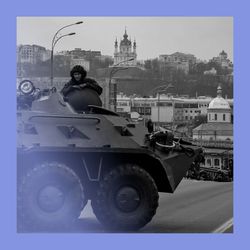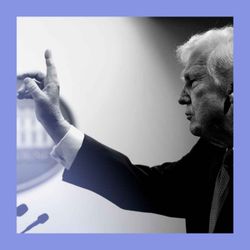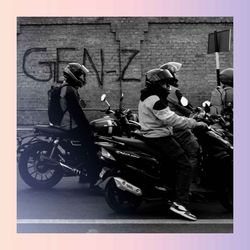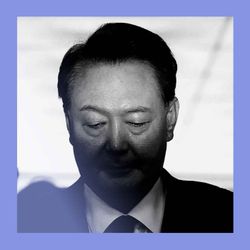Share

The Intelligence from The Economist
The Intelligence: America gets a House speaker
•
With the accession of Mike Johnson as the lower chamber’s majority leader, Congress can at last get back to lawmaking—unless the leadership circus starts again. China’s banks may be loaded up with hidden bad loans; the industry’s covid-era hangover could be about to intensify (09:29). And why so many films have become so very, very long (17:35).
Sign up for Economist Podcasts+ now and get 50% off your subscription with our limited-time offer.
If you’re already a subscriber to The Economist, you’ll have full access to all our shows as part of your subscription.
For more information about how to access Economist Podcasts+, please visit our FAQs page or watch our video that explains how to link your account.
More episodes
View all episodes

The Weekend Intelligence: How to prepare for an invasion
43:51|Just one generation after they gained independence, people in the Baltic States are watching the threat from the Kremlin creep closer and closer. In Lithuania, the government is preparing the population to resist an invasion. On “The Weekend Intelligence” Katie Bryant travels to Vilnius to ask how facing up to threat is changing the nation. Topics covered:LithuaniaCivil defenceDisinformationListen to what matters most, from global politics and business to science and technology—Subscribe to Economist Podcasts+For more information about how to access Economist Podcasts+, please visit our FAQs page or watch our video explaining how to link your account.Music by bluedot Sessions and Epidemic Sound.This podcast transcript is generated by third-party AI. It has not been reviewed prior to publication. We make no representations or warranties in relation to the transcript, its accuracy or its completeness, and we disclaim all liability regarding its receipt, content and use. If you have any concerns about the transcript, please email us at podcasts@economist.com.Read more about how we are using AI.
Bot the difference: AI’s absence in economic data
22:31|For all the promise of transformation that artificial intelligence offers, a close look at macroeconomic data shows little change. Sit tight. A brutal attack in Nigeria reveals how the security crisis is spreading ominously. And a tribute to Virginia Oliver, who cut an unusual figure on the lobster boat she skippered for decades.Guests and host:Alex Domash, economics correspondentỌrẹ Ogunbiyi, Africa correspondentJon Fasman, senior culture correspondentJason Palmer, co-host of “The Intelligence”Topics covered: Artificial intelligence, macroeconomicsNigeria, security, jihadismVirginia Oliver, Maine, lobstersGet a world of insights by subscribing to Economist Podcasts+. For more information about how to access Economist Podcasts+, please visit our FAQs page or watch our video explaining how to link your account.
Poised and confused: the will-he-won’t-he of Iran strikes
24:55|As a military build-up continues in the Middle East, President Donald Trump’s messaging remains ambiguous. What could, at this stage, head off conflict? Our series on America’s 250th birthday continues with a dive into our archive on the era leading up to civil war. And a couple of recommendations for the silver and the small screen.Guests and host:Gregg Carlstrom, Middle East correspondentAnnie Crabill, senior digital editorAlexandra Suich Bass, Culture editorJason Palmer, co-host of “The Intelligence”Topics covered: Iran, nuclear deal, military build-upAmerican historyentertainment, “Dreams”, “Bridgerton”Get a world of insights by subscribing to Economist Podcasts+. For more information about how to access Economist Podcasts+, please visit our FAQs page or watch our video explaining how to link your account.
Chapo, Mayo, Mencho: another Mexican kingpin falls
24:27|The targeting of “El Mencho”, the leader of one of the country’s two biggest gangs, has resulted in a predictable spate of violence—more of which is virtually assured. We take a rare look inside Russia to see how four years of war has changed the country. And some surprising advice on how to get your best marathon time.Guests and host:Sarah Birke, Mexico City bureau chiefArkady Ostrovsky, Russia editorTim Cross, senior science writerAinslie Johnstone, data journalistJason Palmer, co-host of “The Intelligence”Topics covered: Mexico, cartels, gang violenceRussia, economy, Ukraine warRunning, training, marathonsGet a world of insights by subscribing to Economist Podcasts+. For more information about how to access Economist Podcasts+, please visit our FAQs page or watch our video explaining how to link your account.
A world-changing war: four years in Ukraine
21:04|On the fourth anniversary of a war that many predicted would last mere days, much has changed—even beyond the unthinkable misery in Ukraine itself. Alliances have weakened, Europe is rearming like never before and the very nature of modern war has been redefined. Our correspondents take stock and consider what kind of peace is even possible. Guests and host:Edward Carr, deputy editorOliver Carroll, Ukraine correspondentShashank Joshi, defence editorJason Palmer, co-host of “The Intelligence”Topics covered: war in Ukraine, Russia, defence, diplomacyGet a world of insights by subscribing to Economist Podcasts+. For more information about how to access Economist Podcasts+, please visit our FAQs page or watch our video explaining how to link your account.
When the levy brakes: Trump’s tariffs struck down
21:14|The smackdown by America’s Supreme Court was resounding: the bulk of Donald Trump’s tariffs were instituted illegally. He will try to rebuild his tariff wall, brick by brick—creating a new crop of winners and losers. Australia’s surging One Nation party threatens a conservative coalition that was already looking slightly shaky. And why Agatha Christie’s prolific output is so enduringly popular.Guests and host:Rachana Shanbhogue, business-affairs editorAaron Connelly, Asia diplomatic editorJon Fasman, senior culture correspondentJason Palmer, co-host of “The Intelligence”Topics covered: America’s Supreme Court, Donald Trump, tariffsAustralian politics, Pauline HansonAgatha ChristieGet a world of insights by subscribing to Economist Podcasts+. For more information about how to access Economist Podcasts+, please visit our FAQs page or watch our video explaining how to link your account.
The Weekend Intelligence: Inside Nepal’s Gen Z Revolution
41:38|Nepal’s youth took to the streets last September when the government banned social media. It became a protest about corruption. Police killed 19 protestors, the youngest just twelve years old. After a day of violence the parliament building in Kathmandu lay smoldering, the prime minister had fled, and Nepal was left with a burning question—what next?The Economist’s Jiehao Chen visited Nepal to meet the Gen Z revolutionaries trying to repair their fractured nation. Topics covered:NepalGen-Z protestsSocial media banListen to what matters most, from global politics and business to science and technology—Subscribe to Economist Podcasts+For more information about how to access Economist Podcasts+, please visit our FAQs page or watch our video explaining how to link your account.Music by Blue dot and EpidemicThis podcast transcript is generated by third-party AI. It has not been reviewed prior to publication. We make no representations or warranties in relation to the transcript, its accuracy or its completeness, and we disclaim all liability regarding its receipt, content and use. If you have any concerns about the transcript, please email us at podcasts@economist.com.Read more about how we are using AI.
The arrest is history: Andrew Mountbatten-Windsor
22:00|The detainment of King Charles’s brother is almost without precedent in Britain’s long royal history. He denies wrongdoing, but damage to “The Firm” is already assured. Saudi Arabia and the United Arab Emirates have fallen into a very public spat that may have grave implications far beyond the region. And our obituaries editor reflects on the life of Jesse Jackson.Guests and host:Sonny Loughran, Britain writerGregg Carlstrom, Middle East correspondentAnn Wroe, Obituaries editorJason Palmer, co-host of “The Intelligence”Topics covered: Andrew Mountbatten-Windsor, Britain’s royal family, Jeffrey EpsteinSaudi Arabia, United Arab Emirates, diplomacyJesse JacksonGet a world of insights by subscribing to Economist Podcasts+. For more information about how to access Economist Podcasts+, please visit our FAQs page or watch our video explaining how to link your account.
The splitting image: Yoon verdict will deepen divisions
25:47|Yoon Suk Yeol, South Korea’s ex-president, has been handed a life sentence for insurrection. That is by no means the end of the story of division in the country. Nervous AI-watchers fret about which workers might be replaced; our analysis suggests white-collar workers can breathe easy. And the memoir of Gisèle Pelicot, a rape survivor turned global symbol of strength.Guests and hosts:Noah Sneider, East Asia bureau chiefAlex Domash, economics correspondentAlexandra Suich Bass, Culture editorRosie Blau, co-host of “The Intelligence”Jason Palmer, co-host of “The Intelligence”Topics covered: South Korea, Yoon Suk YeolAI, white-collar jobsGisèle Pelicot, memoirGet a world of insights by subscribing to Economist Podcasts+. For more information about how to access Economist Podcasts+, please visit our FAQs page or watch our video explaining how to link your account.